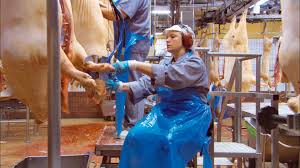Director: Nikolaus Geyrhalter,
Watched on: DVD,
Rating: 4.5/5.
I would time your viewing of Our Daily Bread thoughtfully. The film will most likely influence your upcoming trip to the grocery store. It may ruin your next meal. It will most certainly kill your appetite.
A German-Austrian production directed and shot by Nikolaus Geyrhalter, Our Daily Bread contains no narration, talking heads, characters, music, special effects, or on-screen graphics, including location identifiers. The entire movie consists of magnificently composed, dynamically rendered scenes of food production. From farm fields to greenhouses to cattle cars to slaughterhouses, we watch–sometimes in disbelief, but most often in horror–at the utterly dehumanized, mechanized, highly technological systems man has created to get the very stuff that sustains our world from the plant and the animal it comes from into our mouths and stomachs. After the 90 disturbing, but breathtaking minutes of this movie, you will never look at the food you eat the same way again.
With explicit irony, we watch scene after scene of vast fields of crops sprayed with pesticides; of cavernous greenhouses hosed down with chemicals; of stadium-sized barns stuffed to standing-room-only with hens; of baby chicks speeding down conveyor belts and shot off into bins; of salmon crammed into underwater pens, then harvested into tubes and finally sliced by mechanical saws. There’s more: pigs are prodded into a dumpster sized contraption, squeal for their lives, and then tumble out dead, before a gigantic electric slicer guts them, their intestines slide out, and their hooves are scissored off by a bored worker in an apron and face mask. Cows get the same treatment, after death arrives as a bolt to the brain. These sequences—especially a shot of a woman intently sharpening a knife on a rotating disc—look like scenes from torture porn.Vegetarians don’t get off much easier in Geyrhalter’s macabre vision. A man, sheathed head to toe in a hazardous materials suit, saturates a hothouse full of tomatoes with some kind of insecticide, which are then harvested for consumption.
We aren’t treated to the expected follow-up to these scenes—the brightly lit produce and meat sections of grocery stores, with consumers shopping for the evening meal. Instead, we see the workers themselves on their lunch breaks, consuming what we imagine is the very food they’ve participated in the manufacture of.
Our Daily Bread portrays a world of giant machines reaping what other machines have sown; a system of supply and demand so detached from human touch, so relentlessly geared to high volume and consumer need, that what we come to expect of our food—taste, satisfaction, sensuality—is erased from the equation. The humans who are part of the assembly line process are rendered, by the repetitive grind of their actions and their dispassionate gazes, as merely more mechanistic cogs in the wheel. The movie is frightening in its downbeat observational documentation of reality, and as gleefully cinematic as a science fiction epic. One of the more fascinating vignettes shows two men descending in a high-speed elevator down a scarily deep shaft, then driving through a long white rock tunnel, and arriving at a work site where a huge truck gathers up white dust, which, as it turns out, is salt. This sequence gives new meaning to the phrase “back to the salt mines.”
The director’s decision to deny us the trite satisfactions of the issue-oriented documentary—the activist films that rail against Franken foods and genetically modified seeds, peppered with interviews and commentary evoking the outrage of the choir—is a brilliant stroke, since we are left to fumble for judgments against invisible perpetrators, or rather, we can only judge ourselves, since we are all indicted in a world in which the technology we’ve engineered exists only to gratify our need to consume. That is why Our Daily Bread, besides being one of the best films of the last few years, is also one of the most powerful. It is now available on home video.

